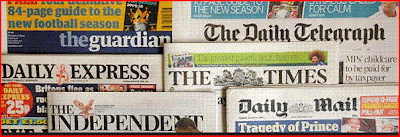Friday, 3 May 2013
Media Quotes of the Week: Wanted a Fleet Street champion, fear at the BBC and the most significant invention for journalism since the telephone
Ian Burrell in the Independent: "Since the Leveson inquiry was announced, the press has lacked a credible figurehead who can connect with the public in a similar way to Hugh Grant of the media-reform group Hacked Off. Fleet Street lacks a champion."
Respect at Work Review on the BBC: “Throughout our conversations we heard a strong undercurrent of fear; fear of speaking out, fear of reprisal, fear of losing your job, being made redundant, fear of becoming a victim, fear of getting a reputation as a troublemaker and not getting promoted if an employee, or further work if a freelancer, supplier or contractor."
Torin Douglas, the BBC's media correspondent who leaves the Corporation this month after 24 years, in a Press Gazette interview: “The fact is, morale within the BBC is not good – particularly with the strikes and everything. A lot of BBC staff are unhappy about the pay of their managers, the way the BBC is managed and so on.”
Downing Street source quoted by the Independent: “The Royal Charter put forward by the three parties and agreed after 22 weeks of consultation with the newspaper industry is the one we think should go forward.”
A statement from Stuart Hall's solicitor, when he was first charged in December, as reported by the Daily Mail: 'Stuart Hall is innocent of these charges. He is unable to comment further at this stage. It is a matter of concern that in the week following publication of the Leveson Report there appears to have been systematic, measured leaks to the media which have given a misleading impression of what this case is about."
Joel Simon, executive director of New York-based Committee to Protect Journalists, responds to Hacked Off's Brian Cathcart: "Of course, it is natural that Cathcart would come to a different conclusion, since he has a very different role. His brief is to advocate on behalf of the victims of media abuses, who unquestionably deserve our support and sympathy. Our role is to defend the basic principles of press freedom and the rights of journalists to report the news. I have no doubt that Cathcart believes a Royal Charter supported by statute is the best solution for Britain. But it is not the best solution for journalists around the world, and that is why we oppose it."
Oxford Mail group editor Simon O'Neil, quoted by the Newspaper Society on the Government's draft Royal Charter on press regulation: "I am disappointed, but not surprised, that despite fine words from MPs of all parties, including the three leaders, the impact this would have on the regional press has been completely ignored, or at best viewed as collateral damage. They clearly believed that if they patted us on the head we’d just go away. They were wrong."
The Daily Telegraph after being banned by Newcastle United for claiming there was a 'split' in the dressing room: "We regret the club's decision to ban the Telegraph from attending matches and press conferences, but will not allow it to prevent us providing the most incisive, trustworthy Newcastle coverage, rather than pandering to what the club want you to read."
Southern Daily Echo editor Ian Murray after revelations in the paper (above) forced the leader of Southampton City Council to quit, as reported by HoldTheFrontPage: “It was shocking in the end that the council’s legal department attempted to silence us with threats before we published our investigations based on their own report. This was a clear matter of public interest. If we had not lifted the lid on this issue then no one else would have revealed what was going on. As a lesson in why a free and vibrant local press is needed to scrutinise local democracy I can think of no better example.”
Martin Kettle in the Guardian: "In the course of the post-Leveson debate, a great principle – the free press – has been shamelessly hijacked by vested interests. Freedom has been elided with press self-interest. Press opposition to reform has been brash, heavy-handed and single-minded. Even the extraordinary all-party agreement in March to put significant parts of Leveson under the umbrella of a royal charter caused only momentary hesitation. In the end, not even the fact that no single MP voted against the agreement counted for anything. The press ignored parliament's verdict."
Steve Hewlett in the Observer: "With the moonlight flit to Wapping, Murdoch moved to take on the print unions who had supported his purchase of the Sun. And difficult and brutal as it was, there is now a consensus, more or less, that change had to happen and that, by acting in a way no other press owner dared to do, Murdoch has extended the commercial life of Britain's press by at least 20 years."
Janet Street Porter in the Mail on Rachel Johnson: "Pushy Rachel has talked up editing a minor magazine (The Lady) into a major journalistic achievement - at least I've edited a national newspaper."
Roy Greenslade on his MediaGuardian blog: "Journalism is too important to our democracy to be permitted to wither on the vine because rapacious bankers are squeezing companies that put profit before public service."
Emily Bell, speaking at the International Journalism Festival: "Twitter is the most significant invention for journalism since the telephone".
Subscribe to:
Post Comments (Atom)






2 comments:
The editor of the Southern Daily Echo is Ian MURRAY
Thanks GreyBeard, I've corrected it.
Post a Comment